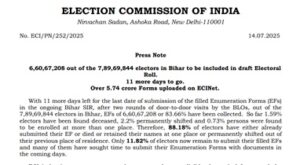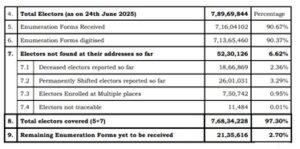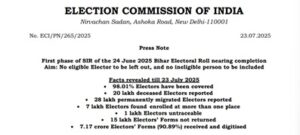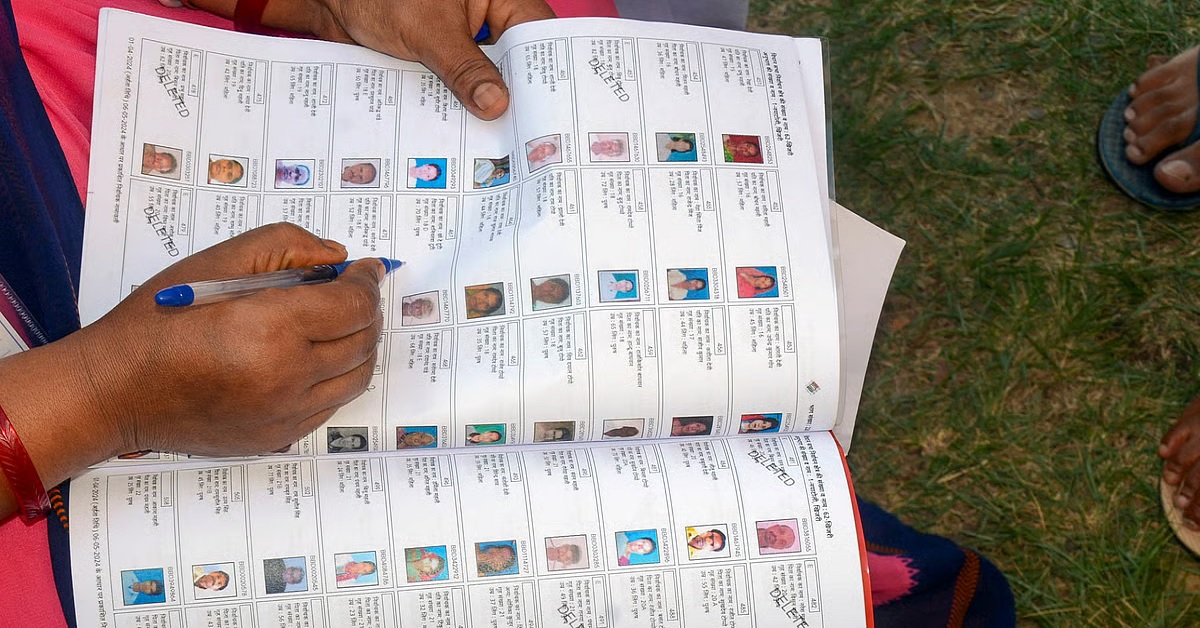Bihar’s political sphere is currently gripped by a burgeoning controversy surrounding the Special Intensive Revision (SIR) of its electoral rolls, an exercise undertaken by the Election Commission of India (ECI) just months before the upcoming state assembly elections. While the ECI asserts its aim to purify the voter list, the recent release of two provisional figures within a span of 24 hours has elicited concern and accusations of potential disenfranchisement. A particularly striking development is the staggering 809% surge in “untraceable electors” within a mere 24 hours, jumping from 11,484 on July 22 to a jarring 1 lakh by July 23, 2025.
This inexplicable overnight explosion in a critical voter category, coupled with the overall increase in electors’ data marked for deletion from 35 lakh to 56 lakh in the same period (July 14 to July 23, 2025), unless the contrary proved.
A skyrocketing surge in just 24 hours
The initial phase of the SIR, as reported by the ECI on July 14, indicated that out of Bihar’s total 7,89,69,844 electors, enumeration forms from 6,60,67,208 individuals, or 83.66%, had been successfully collected. At that juncture, the ECI had identified specific categories for deletion, 1.59% of electors were found to be deceased, 2.2% had permanently shifted residence, and 0.73% were identified as having multiple entries. This initial accounting suggested that approximately 88.18% of the electorate was either verified or categorised for deletion based on these criteria.

The figures emerging from the SIR are indeed startling, particularly the overnight jump in “untraceable electors.”
However, subsequent data releases unveiled a concerning volatility. On July 22, the ECI reported 11,484 “untraceable electors.” In an astonishing and unexplained leap, this figure surged to a staggering 100,000 by July 23 – an astronomical increase of approximately 809% within a mere 24 hours. This sudden surge in a highly problematic category of voters has become a central point of contention, raising serious questions about the methodologies and consistency of data collection and classification during the SIR.

Furthermore, the overall number of electors marked for deletion also witnessed a significant escalation. On July 22, with voter coverage reportedly at 97.30%, the count of electors flagged for deletion stood at 52 lakh (5.2 million). Yet, by July 23, with coverage marginally increasing to 98.01%, this figure jumped to 56 lakh (5.6 million). This implies that an additional 3 lakh (300,000) voters were identified for deletion in just a single day.

The sheer magnitude and rapid rate of these proposed deletions, particularly in the final stages of the revision, are fuelling a suspicion that the SIR may extend beyond a routine clean-up, potentially impacting the democratic rights of a significant portion of Bihar’s electorate.
The ECI’s justification and the underlying concerns
The Election Commission of India (ECI) is currently undertaking a Special Intensive Revision (SIR) of electoral rolls in Bihar, its first in 22 years, which it defends as crucial for maintaining the “purity of elections.” This exercise aims to remove deceased voters, permanent migrants, and duplicate entries, with ECI data as of July 23 showing 56 lakh electors identified for deletion.
Questions of timing and documentary requirements
However, this SIR has ignited a firestorm of criticism from opposition parties and civil society groups, who allege it’s a politically motivated attempt to disenfranchise marginalised communities. Their concerns are multi-layered, beginning with the highly suspect timing of the SIR just months before the Bihar assembly elections, which critics argue should have been conducted well in advance to avoid any perception of impropriety.
⚠️ ALARMING DISCREPANCIES ⚠️
Two glaring red flags have emerged from the Special Intensive Revision of the voter list in Bihar:
🚨 On 22nd July, the number of untraceable electors stood at 11,484. By 23rd July, that number suddenly exploded to 1 LAKH
🚨 At 88.18% voter… pic.twitter.com/3icF2UkZZt— All India Trinamool Congress (@AITCofficial) July 24, 2025
Furthermore, the methodology and documentary requirements have drawn fire; despite the ECI’s claim that Aadhaar, voter ID, and ration cards are not mandatory, their limited use for identity verification raises worries for poor and migrant workers who often lack readily available official documentation. This also shifts the burden of proof onto individual citizens, a challenging process for those with limited literacy or resources, issues currently being heard by the Supreme Court.
Opposition may boycott Bihar poll, says Tejashwi Yadav
In a stunning declaration Thursday, July 24, RJD leader, Tejaswi Yadav again alleged the Election Commission is for “working at the behest of BJP and ruling NDA” and might boycott the polls after taking feedback from people and alliance partners. Dramatically, he, the Leader of the Opposition in the Bihar Assembly, Tejashwi Yadav, has indicated that Opposition parties might boycott upcoming State Assembly elections in Bihar after taking feedback from people and our alliance partners, reports The Hindu.
“We will see what people want and what our allies say. If the state polls are conducted in a partial and manipulative manner where it is already decided who would win what number of seats, what is the use of conducting such an election? We may consider boycotting the upcoming state assembly elections in Bihar after taking feedback from people and our (alliance) partners”, Mr Yadav, who is from the Opposition Rashtriya Janata Dal, told a news agency on Wednesday (July 23, 2025).
Earlier in the day on July 23, there was a verbal duel between ruling NDA and Opposition mahagathbandhan (grand alliance) legislators on the third day of monsoon session of the Bihar Assembly over the issue of Special Intensive Revision (SIR) of the electoral roll in the State. Thereafter, while addressing media persons, Mr. Yadav alleged the Election Commission for “working at the behest of BJP and ruling NDA” and claimed that “the possibility of deletion of 50-80 lakh voters from the voter list is alarming”.
“If we have so many deletions from the voters list, it is clear that there would be 3,000-4,000 names of voters who would be struck off from the electoral roll on each booth of the state and this is the conspiracy of the NDA to get favourable results in the poll,” alleged Mr. Yadav.
“If they (NDA) want to win elections through fraudulent means, then what is the point in conducting elections? Chunav mat karwao (don’t hold the elections),” he quipped while speaking to the reporters.
“We’ll consult our (alliance) partners and people before taking a final decision on this (boycotting the poll),” he added.
The Indian National Congress (INC), an ally also came out in support of RJD on the issue. “Yes, we’ll seriously discuss the issue (of boycotting the poll)… we could join any form of protest. If voters are denied their franchise, what remains in a democratic set-up of the country?” asked senior state Congress leader and legislator party leader in the State Assembly, Shakeel Ahmad Khan.
The ruling party (JD-U) leader and party spokesperson Neeraj Kumar, however, slammed Mr. Yadav for the “poll boycott threat”. “His (poll) boycott threat shows sheer desperation and hopelessness. Has he (Mr Yadav) forgotten that the people of the state had limited his party (RJD) to just four seats in the last Lok Sabha elections in 2024?”, said Mr. Kumar.
The Opposition mahagathbandhan (grand alliance) leaders are expected to “take a final call on poll boycott in days to come”, the other leaders of mahagathbandhan told The Hindu over a phone call.
“Possibly, after the ongoing monsoon session of the state legislature, which is scheduled to be concluded tomorrow on July 25,” said one of the senior Left party leaders while seeking anonymity. The three Left Parties — the Communist Party of India (CPI), the Communist Party of India-Marxist (CPM) and the Communist Party of India-Marxists-Leninist (CPI-ML) — are part of the Opposition mahagathbandhan in the State.
The State Assembly elections in Bihar are due in October-November later this year.
Bihar’s SIR: Impractical deadlines and opaque deletions
The remarkably short deadline for form submission, July 25, 2025, is deemed impractical, especially for Bihar’s significant migrant population, with 15 lakh voters yet to submit forms, risking the exclusion of legitimate voters due to logistical hurdles or lack of awareness, despite online and WhatsApp options. Finally, deep concerns persist regarding the opacity of the deletion process itself. The sheer volume of proposed deletions and limited time for verification, even with lists shared with political party-nominated Booth Level Agents, raise serious doubts about the thoroughness and fairness of the process, fuelling fears of erroneous deletions that could disproportionately impact specific demographic groups.
ECI’s stance on voter IDs and citizenship verification in court
he ongoing Special Intensive Revision (SIR) of Bihar’s electoral rolls has been further complicated by the Election Commission of India’s (ECI) recent affidavit to the Supreme Court. Filed on July 21, 2025, the ECI, through Deputy Election Commissioner Sanjay Kumar, stated that Electoral Photo Identity Cards (EPICs/Voter IDs) cannot be considered primary documents for new entries, categorising the SIR as a “de novo revision process.” While acknowledging Aadhaar’s utility for identification, the ECI reiterated it’s not a standalone proof of eligibility or citizenship. Furthermore, the ECI defended its right to verify citizenship, citing its constitutional mandate under Article 326 and Sections 16 and 19 of the Representation of the People Act, 1950, to ensure only citizens are registered.
Divergence from Supreme Court’s concern and ground realities
This stance directly challenges the Supreme Court’s July 10, 2025, observation that EPICs, Aadhaar, and ration cards should be considered valid. The ECI justified excluding ration cards due to “widespread prevalence of fraudulent cards.”
This significant deletion rate, coupled with the ECI’s stringent documentary requirements and its assertion of citizenship verification powers, has fuelled concerns from opposition parties and civil society about potential widespread disenfranchisement, particularly of marginalised sections. Many reports have also reported ground-level procedural flaws. The next Supreme Court hearing on July 28, 2025, will be crucial in addressing these contentious issues.
Related
ECI to SC: Voter ID insufficient for Bihar roll, defends citizenship verification power

